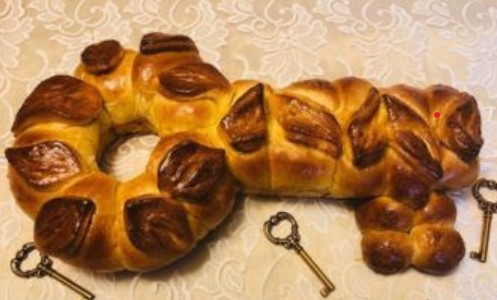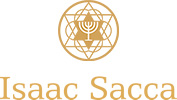The danger of the “Challah Key”

What is the “Challah Key”?
Baking key-shaped loaves or placing a key into the dough to be baked to make post-Passover Shabbat bread is a novel custom that became popular in certain circles in the last few years. It is called “Shlissel Challah”, from the Yiddish “Shlissel” (key) and “Challah” (popular name for Saturday bread). Popularly it is believed that it is a spell (manipulation of energies) that brings blessing to the home, especially Parnasa (economic sustenance) and health.
Origin of this custom
This rite is not mentioned in any classical source. It does not appear in the Tanach, nor in the Mishnah, nor in the Talmud. Neither in any Midrash, nor in any medieval or modern Posek (legislator of Jewish Law). It is only first mentioned by the Apter Rebbe (Rabbi Abraham Ioshua Heshel of Opatów, Poland), a Hasidic Rebbe from the early 19th century. He does not say that this is an obligation or that it has any special power to obtain sustenance or wealth. Rather, it is a popular custom that symbolizes an idea: only God is the one who holds the key to sustenance . This rabbi limited himself to giving meaning to a folk custom that was observed among some of his contemporaries. However, there is nothing magical in this matter. It is a simple popular custom.
Also among other cultures there are groups that carry out this practice in a very similar way. Among the Gentiles, keys were made in the shape of a cross in countries where Christianity was prominent. At Easter, loaves with keys in the shape of a cross to symbolize Jesus “rising” from the dead.
Probably it is an old popular practice, taken up and adapted by different peoples according to the context, without considering its usefulness or its reason to be.
Analysis from the halachic point of view
The practice of Judaism is closely tied to tradition. Inventing religious traditions without logic or meaning is condemned by the Torah itself. Judaism is dynamic and in different circumstances it incorporates or relegates some practices. However, these changes are only made for a rational reason and an understandable argument. In turn, there are adequate legislative mechanisms to make these changes. The “Challah Key” is not a religious obligation or a precept, nor does it have a rational motive or legal basis. As long as it is considered a mere folkloric custom, there is no problem. Just as it is to eat some typical food at certain times such as Sufganiot (fritters) on Hanukkah or Ozné Haman (dumplings shaped like ears) on Purim. At best, it will be a matter of personal taste or family heritage and can be credited with some nice and inspiring symbolism. However, to think that a loaf with a key or in the shape of a key has spiritual, mystical or magical powers is ridiculous and is comparable to paganism.
Sources
The Rambam, in the Mishneh Torah (Hilchot Avodá Zará 11) is pronounced in harsh terms regarding this type of magic spell:
“All of the above matters (the irrational spells) are falsehoods and lies with which the original idolaters deceived the Gentile nations into leading after them. It is not appropriate for the children of Israel to be drawn into such a void, nor to consider that they have any value as it says [Bamidbar 23:23]: “No black magic can be found among Jacob, or occult arts within Israel.”
Similarly, he says [Debarim 18:14]: “These nations that are expelling listen to astrologers and fortune-tellers. This is not what God has given you.” Whoever believes in (magics) in their heart and thinks they are true and words of wisdom, but forbidden by the Torah, it is foolish and weak.
The masters of wisdom and those of perfect knowledge know with clear evidence that all these crafts that the Torah has forbidden are not reflections of wisdom, but rather, emptiness and vanity that attracted the weak of mind and made them leave all the ways of truth. For these reasons, when the Torah warned against all these empty issues, it advices [Debarim 18:13]: “Be in perfect faith with God, your Lord.”
The Torah says: “According to their laws (of the pagans) they will not head off” (Vaikrá 18: 3).
The Babylonian Talmud (Shabbat 67a) teaches that all practices that want to obtain some benefit and lack scientific support are Darké HaEmorí (pagan Amorite rites) and performing them constitutes a transgression that denigrates the human being since he was differentiated from the creatures with his intellect and soul and, instead of appealing to his reason, he gives himself to ignorance and materialism.
The message
The message is strong: adopting a practice, whatever it is, and ascribing magical powers to it is paganism. Therefore it is prohibited by the Torah.
In summary, two of the essential pillars of the Torah are: (1) the opposition against magical spells and irrational practices from which the person tries to obtain benefits and (2) the opposition to the invention of religious precepts that are not originated in the Torah itself or in the opinions of the Hachamim (Sages).
From the essential point of view of the Jewish faith and common sense, the most serious and dangerous of this type of practices – when they are considered “Segulot” (spells for good luck) instead of mere customs of popular taste – is that they record in the unconscious the idea that well-being relates to meaningless empty acts, rather than relating well-being to real virtue. This is the main reason why the Torah rejects all forms of magic or sorcery and focuses on the noble attitude and the improvement of qualities.
The problem is not the “key-shaped challah” – at best, a sympathetic custom – but the idea behind it: trying to manipulate God for personal gain. That is the essence of paganism, and that is why we must fully reject many of the popular “Segulot”.
Do not look for magic solutions
In the face of adversity, our ancestors did not bake key-shaped breads. None of the matriarchs and patriarchs performed spells to become pregnant or have children upon realizing their sterility. They prayed to God and did everything scientifically and materially necessary to achieve their goal. And, whatever the results of the prayer and their efforts, they always worked to improve their qualities; they practiced love to the neighbor and charity, they studied Torah; they dedicated themselves to being more benevolent towards their partners and children; they helped the needy, they gave themselves to the community; they helped the sick and old, and fed the hungry.
Instead of falling into the frivolity of materialistic ignorance that tries to manipulate God as a means of obtaining a comfortable life, we should follow the example of our ancestors and redouble our efforts towards virtue in all our ways.

